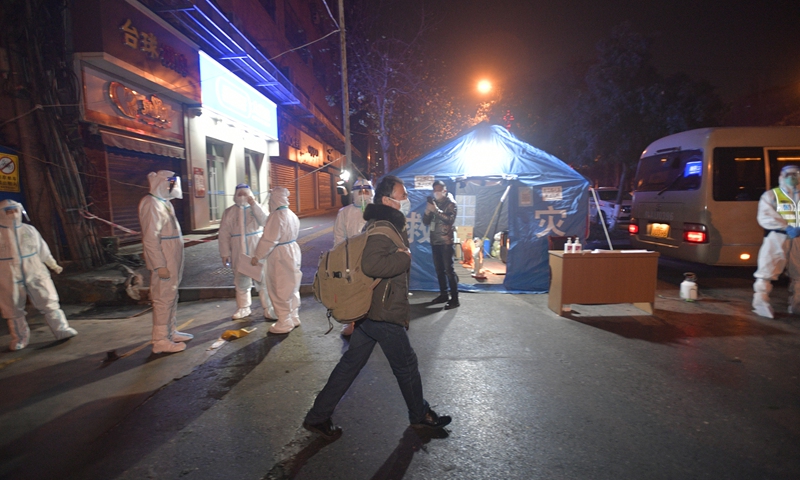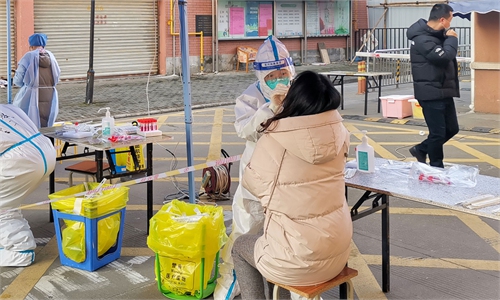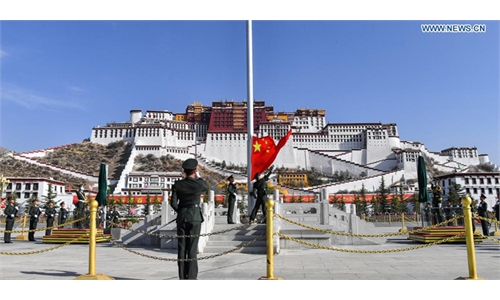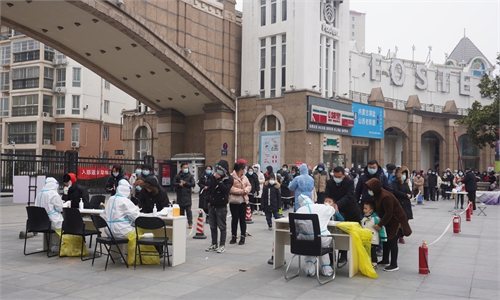Vice premier Sun laments loopholes in treatment of patients in Xi'an
COVID-19 outbreaks challenge Spring Festival, Winter Olympics

Residents are transported to centralized quarantine hotels in Xi'an, Shaanxi Province on December 30, 2021. Photo: VCG
As the COVID-19 spread in Northwest China's Shaanxi Province remains to be subdued, neighboring Central China's Henan Province and East China's Zhejiang Province are facing an onslaught of the outbreak, whose causes remain unknown. As China prepares to celebrate its Lunar New Year and the Beijing 2022 Winter Olympic Games in a month, such flare-ups were described by epidemiologists as "concerning, but controllable," and they warned against a potential massive travel restriction.
The huge travel rush across the country during the upcoming month is also expected to weigh on local governments, for it poses as a test for their governance ability, especially those in rural areas where they tend to adopt "one-size-fits-all" and overly harsh COVID-19 prevention measures for arrivals, said experts.
Chinese Vice Premier Sun Chunlan said on Thursday that she felt heartbroken as she saw loopholes in the current anti-epidemic work in Xi'an in the lack of timely treatment of some local patients.
The anti-epidemic work is to protect lives and health, so there's no excuse to neglect patients amid the ongoing epidemic.
An official from the Xi'an city Health Commission on Thursday apologized publicly to the pregnant woman who lost her baby due to delayed treatment and promised to learn lessons from it. He vowed to spare no efforts to ensure residents' medical needs amid the latest coronavirus outbreak.
Several officials and hospital-related persons-in-charge in the city were disciplined for their poor anti-virus performance.
But experts also noted that the loopholes exposed in those places, or this time in Xi'an should not be hyped by Western media as "proof" to attack China's zero-COVID policy, as the country has always tried to find a balance of "precise prevention" and has ever refined its COVID-19 policies during the fights against flare-ups.
Yet the number of cases in Xi'an has slipped to two-digit numbers since Sunday. The city government also declared on Wednesday that all confirmed cases were detected within the quarantined areas, and no transmission was found within residential communities.
Li Qun, chief of emergency center of Chinese Center for Disease Control and Prevention (CDC), who is part of the epidemiological investigation in Shaanxi, told media on Thursday that Xi'an has achieved a phased victory over the COVID-19 fight, as the cases are declining and the "risk of an outbreak bouncing back is under control."
"The situation in Henan looks more worrying as what caused the infection remains unknown, and the infection has spilled over from Yuzhou to several other places," Wang Guangfa, a respiratory disease expert at Peking University First Hospital, told the Global Times on Thursday.
Six cities in Henan reported COVID-19 cases, among which 90 cases are hospitalized, and 22 asymptomatic cases are under medical observation.
In order to curb the flare-up, Yuzhou announced a lockdown on January 3; Zhengzhou, Henan's capital city with a population of more than 12 million, conducted citywide nucleic tests on Wednesday.
Twenty-nine cases were reported in East China's Zhejiang Province since the latest spike started on January 1. Yiwu, a city in Zhejiang, suspended flights to Beijing starting Thursday, despite no reported cases in the city.
Finding a balance
The sporadic outbreaks have alerted many Chinese preparing to travel during the Chinese Lunar New Year travel rush season, which lasts 40 days from January 17 to February 25. Beijing is also remaining vigilant as it is less than one month before the opening of the Olympic Winter Games Beijing 2022.
Wang said the situation is concerning as the travel rush will weigh on the COVID-19 prevention work for governments at all levels; and the Delta variant, which caused flare-ups in Shaanxi, Henan and Zhejiang, is more contagious and harder to control.
However, another Beijing-based immunologist said on condition of anonymity that it still remains unknown what caused the outbreaks in Xi'an, Henan and Zhejiang. Strict measures must be in place until the causes are found out, said the expert, noting only in such a way will the outbreak be contained.
Yet neither expert approves of massive travel restrictions during the festival and the Beijing 2022 Games as Wang said the point is to find a balance between staunching transmission and ensuring people's normal lives.
"Xi'an is gradually soothing. The outbreak in Henan is a small-scale infection within the province. Plus, China has already accumulated abundant experience in dealing with outbreaks, so the situation is basically under control," said the anonymous immunologist.
Fourteen government agencies, including the Ministry of Public Security, Ministry of Transport and National Health Commission, issued a notice warning local governments of a "one-size-fits-all" mentality and imposing extra COVID-19 policies, media reported on Thursday. The notice asked governments to simplify the process of checking people's health codes, and guarantee people's travel while implementing virus prevention measures.
Ever-changing, perfecting policy
Epidemiologists noted that local governments of second-, third-tier or smaller cities are prone to take this "one-size-fits-all" approach, and are sometimes slow to react. Wang said that the loopholes exposed at the early stage of Xi'an's fight against COVID-19 should serve as a lesson.
In the past weeks, Xi'an was not only under the onslaught of the virus, but was also criticized, because the city was slow to detect confirmed cases at the early stage. Some of the city's residents took to the internet to complain about a "one-size-fits-all" quarantine policy in some areas of the city. The constantly crashed COVID-19 tracking app added more inconvenience to residents, a shortage of food in some residential areas, and conflicts between COVID-19 prevention workers and stranded residents fueled the criticism.
Zeng Guang, chief epidemiologist of the CDC, told the Global Times on Thursday that the outbreak in Xi'an is the worst since the Wuhan outbreak in 2020, and the Northwest China metropolis is facing an arduous task of fighting a more contagious and dangerous variant than the variant in Wuhan. "People across the country should give them support, and hopefully Xi'an can soon create a new experience to contain the viral spread, even if it was bungled at an early stage.
China's top respiratory expert Zhong Nanshan also said in an interview with China Central Television that the inflection point for Xi'an has arrived, because the city adopted stringent measures and seem to be working.
Many Western media, including the Washington Post and New York Times, also hyped the situation in Xi'an and amplified individual cases to depict the city as a "humanitarian crisis." Epidemiologists said that Xi'an is figuring out a way, and that it is unfair to negate the city's efforts and achievements, or even deny China's zero-COVID policy because of some problems.
BBC also took the case of Yuzhou, implying the city was forced into lockdown just because of a handful of cases.
Yet volunteers and a Yuzhou resident identified as close contacts told the Global Times that the current COVID-19 policy is the best way to respond to an outbreak, as the cause remains clear. "If the virus travels to other provinces, it will pose a more serious problem," said the volunteer named Qiqi.
The close contact said that the quarantine did not cause her much inconvenience as all things she needed were delivered by medical workers and volunteers. "I feel at home."
Those media decried China for sticking to a zero-COVID mentality, which reflected their ignorance of the country's policies, said the above-quoted expert, noting that the country first stuck to eliminate virus completely, then changed to a dynamic zero-COVID strategy. Xi'an has raised a new concept of clearing cases outside the quarantined or sealed-off areas. "The notion of zero-COVID in China is gradually changing. Western media have ignored this," he said.
"In a country where people are scared to death even if someone from a neighboring compound tests positive, the Western style laissez-faire attitude toward the virus will definitely anger the public," said a Xi'an resident.




